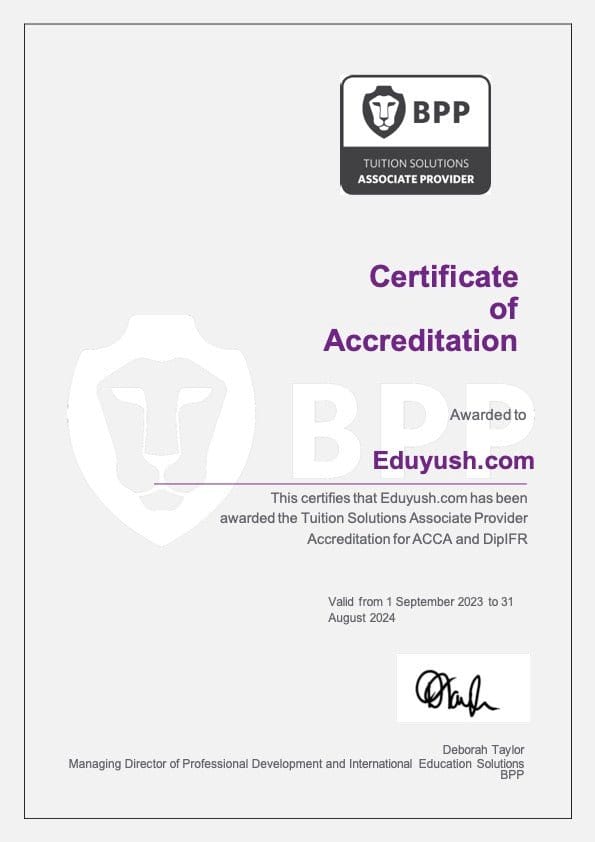How to pass ACCA F5 Exams? | Tips | Resources
How to Pass ACCA F5 Exams
Succeeding in the ACCA F5 exams is no easy task. To pass ACCA F5 exams, you'll need to be diligent and well-prepared. This blog post will outline some tips that can help you achieve success. Stay motivated, focus on your goals, and use the resources available - and you'll be on your way to a successful exam result!
Tips to pass ACCA F5 exams
| Topic | Information |
|---|---|
| Critical Topics from Management Accounting | - Key topics from Management Accounting (MA) relevant to Performance Management (PM). |
| Dealing with Exemptions | Start early, self-assessment quizzes, use ACCA-approved textbooks, read Technical articles |
| Exam Structure | - The exam is computer-based, 3 hours long, with three sections (A, B, C). |
| - Section A: 15 questions covering the syllabus. | |
| - Section B: Mini-scenarios with linked questions. | |
| - Section C: Long-form questions, spreadsheet or word processor. | |
| Section Order Strategy | - Start with Section A, then Section C, and lastly Section B. |
| - Time allocation for each section explained. | |
| Time Management Practice | Set a study plan, practice on the CBE platform, take mock exams. |
| Top Three Tips to Pass | - Solid study plan, extensive practice, cover the entire syllabus. |
| Conclusion | - Recommendation for BPP online courses to prepare for ACCA F5 exams. |
| - Emphasis on focusing on areas that need improvement. | |
| - Price starting from INR 4900 (50 GBP). |
What is the ACCA F5 or ACCA Performance management exam about?
- Performance Management is a key aspect of Management Accounting.
- It involves monitoring, evaluating, and assessing employees.
- It encompasses processes, policies, and tools to ensure objectives are met.
- Measurement of performance is essential for decision-making.
- The exam focuses on applying management accounting tools to solve business problems.
- Topics include budgeting, profitability analysis, production planning, and transfer pricing.
What are critical topics from the Management Accounting exam to Performance management?
The first thing we learned in MA is the language of accounting and finance. You need that terminology and understanding of cost behaviour of cost classification related to anything in performance management.
- The traditional costing tools that evolved into advanced and modern ones in PM.
- An introduction to budgeting in MA now deals with advanced budgeting in PM
- Time variance analysis introduced in MA now becomes advanced variance analysis in PM.
- Quantitative tools such as the high-low time series regression analysis method are brought forward to performance management.
If you have had an exemption from management accounting, how do you deal with a step up to performance management?
Start early: there's no way you're going to pass, that you put things off till the last weeks before the exams, so don't even try that. Take a course from BPP, you do get covered with prior topics.
Self-assessment quizzes: checkout the performance management self-check quiz on the ACCA website. It's an excellent tool, and you're going to know what you know and don't know, so it's going to help you set a more detailed study plan
Use ACCA-approved textbooks: You'll need to go deeper into the topics and can't do it just with the abbreviated course notes. That textbook would be an excellent tool for that.
Read the ACCA Technical articles. These give you an easy overview on various topics which come in the exams.
What is the performance management exam structure?
It's a computer-based exam, and you get 3 hours for this exam. There are three parts to this exam, 2 of the parts are what is called objective test questions, fill-in-the-blank, multiple-choice drag and drop
The final piece is a long-form question or constructed response, where you give your answers on a spreadsheet or a word processor.
- Section A which is just 15 questions covering the entire syllabus
- Section B, where you get mini-scenarios. You will get three scenarios with questions linked to that scenario, and
- Section C is the long-form part of the exam.
In what order should we complete the sections within an exam for performance management?
-
Section A: Warm-up
- Answer a range of questions covering the syllabus.
- Start with easier questions first; flag difficult ones.
- Allocate about 45-50 minutes.
- Aim to complete as much as possible.
-
Section C: Detailed Responses
- Proceed to Section C, not B.
- Allocate roughly 34 minutes per question.
- Read question verbs and requirements first.
- Provide answers in concise sentences or perform calculations.
-
Section B: Challenging Scenarios
- Approach Section B last; it's often the most challenging.
- Each question set relates to dense mini-scenarios with multiple numbers and details.
- Allocate 17 minutes per question set.
- Prioritize easier questions within each set to manage time effectively.
- Save more time-consuming tasks for the end.
-
Review and Completion
- Return to Section A after completing Sections C and B.
- Answer any unanswered questions.
- If uncertain, make educated guesses; no negative marking.
- Utilize any remaining buffer time for review.
How do you practice time management skills?
Many students come across one reason for failure: lack of time. Here are some tips which, if you adopt them early on in your study plan, can help.
- Set a study plan and look at the whole syllabus. Identify your strengths and weaknesses.
- Practice your question bank questions directly on the CBE practice platform. Start doing this from day one, don't wait till the last couple of weeks before the exams.
- Take a mock exam from any of the approved learning partners
- Understand how the ACCA scratchpad works; it's quite a different experience using a pen versus writing it out when a more limited medium of just line by line or word by word.
Top three tips to pass the ACCA F5 exams
- Make a solid study plan. Stick to it. Pick up the concepts from the MA paper
- Practice, practice a lot of past question papers
- Cover the entire syllabus, don't spot trends from previous question papers. Anything can come in the exams.
Conclusion
If you're looking for reliable and qualitative resources as a way to pass ACCA F5 Exams, look no further than BPP online courses. BPP's experienced tutors will help you focus on the areas you need to improve so that you can succeed on the first attempt. Don't let the daunting prospect of passing these exams keep you from reaching your professional goals - sign up for a BPP course today! Prices start from INR 4800 (50 GBP).
From the blog
View allFAQs
There are several ways to prepare for the ACCA exams, including studying the exam syllabus and practicing past exam questions. You can also attend review courses or hire a tutor to help you prepare. It's also a good idea to create a study schedule and stick to it, and to take breaks and pace yourself during your studies.
If you fail an ACCA exam, you will need to re-register and pay the exam fees again. You may also want to consider reviewing the exam syllabus and studying more before attempting the exam again. It's also a good idea to talk to your tutor or mentor for guidance and to get feedback on where you may have gone wrong.
There is no limit to the number of times you can attempt the ACCA exams, but you will need to pay the exam fees each time you register. It's a good idea to carefully review the exam syllabus and consider seeking additional help if you are struggling to pass the exams after multiple attempts.
ACCA Exams are held four times a year for skill level and strategic level exams. These are held every quarter
March, June, September and December
The CA (Chartered Accountant) qualification is offered by the Institute of Chartered Accountants of India (ICAI). The ACCA qualification is offered by the Association of Chartered Certified Accountants (ACCA).
The CA qualification has been in existence for over 150 years, and is a globally recognised qualification. The ACCA qualification has been in existence for over 100 years, and is also a globally recognised qualification.
The CA qualification is available in India only, while the ACCA qualification is available in over 180 countries.
The ACCA subjects are assessed on a 100-point scale. The pass mark is 50 points. A score of 60 or more is required to achieve the grades of distinction, credit, and merit.
Yes. Passing all exams with a high percentage is an excellent accomplishment and demonstrates that you have a high level of understanding of the material. Employers will see this as evidence of your competence and be likely to consider you for a position if you are looking for work in the accounting field.
The hardest ACCA paper is the F5 performance management paper. This is because it requires a detailed knowledge of financial accounting and management accounting in order to pass.
Other papers that are difficult include the F7 financial reporting paper and the P2 advanced auditing and assurance paper. However, all of the ACCA papers are challenging, so it is important to thoroughly prepare for each one before sitting the exam.











Leave a comment